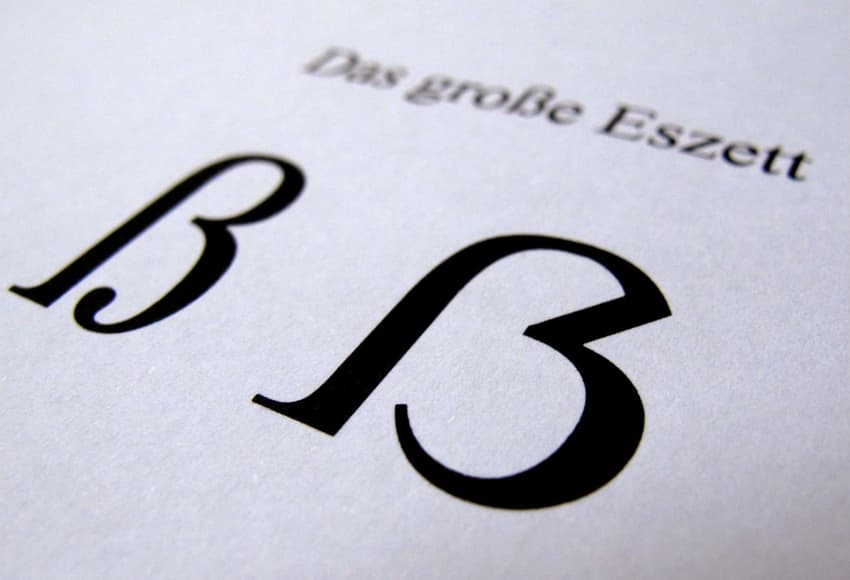After century of dispute, the German alphabet just got a new character

Have you ever been typing in German in a blaze of BLOCK CAPITAL anger, but been stopped short by the inability to write the next letter of the word SCHEI...? Help is finally at hand.
At the end of June, the German Spelling Council decided to add a capital ß (Eszett) to the language, bringing to an end a debate that had raged on in the world of German orthography since the 19th century.
Now, instead of using SS to capitalize the Eszett, Germans should use ẞ.
According to the Süddeutsche Zeitung, the progressives among German orthographers see the decision as a great leap forward. But conservatives refuse to accept it on aesthetic grounds, claiming that the new letter's unwieldy girth make it the SUV of the letter world.
The German Spelling Council defended the decision, saying that it is important for officialdom to be able to distinguish between a name spelled with a double s and one spelled with an ß.
In German passports, names appear in uppercase, meaning that until now, someone with the surname Großmann has had to put up with the humiliation of being confused with a Grossmann.
So now at least those writing angry uppercase emails who get stuck at the "SCHEI" in "Scheiße" have their solution. But they’ll have to see through the red mist to find the combination of Alt Gr+Shift+ß before they can finish their tirade.
A letter with a turbulent history
The Eszett only exists in German and was the only letter in the German language that previously had no capital version. But this peculiarity was rarely noticed as the ß never appears at the start of a word.
This is not the first time that the Eszett has caused civil unrest among German orthographers and writers. An epochal spelling reform in 1996 severely curtailed the use of the letter, with new rules dictating that it should never appear after a short vowel.
Most prominently, the word daß was changed to dass. But debate also raged about whether to change the spelling of Fuß to Fuss.
The German Spelling Council was created in the resultant atmosphere of unrest to find compromise solutions and reinstate “linguistic peace” in the land.
Other changes to German writing made by the German Spelling Council at the end of June were the prohibition of certain “Germanized” ways of writing foreign words. So for instance Joga is now banned - only Yoga is permitted. And any German who writes Ketschup can expect a nasty red line to appear under the word - from now on only Ketchup is correct.
With DPA
Comments
See Also
At the end of June, the German Spelling Council decided to add a capital ß (Eszett) to the language, bringing to an end a debate that had raged on in the world of German orthography since the 19th century.
Now, instead of using SS to capitalize the Eszett, Germans should use ẞ.
According to the Süddeutsche Zeitung, the progressives among German orthographers see the decision as a great leap forward. But conservatives refuse to accept it on aesthetic grounds, claiming that the new letter's unwieldy girth make it the SUV of the letter world.
The German Spelling Council defended the decision, saying that it is important for officialdom to be able to distinguish between a name spelled with a double s and one spelled with an ß.
In German passports, names appear in uppercase, meaning that until now, someone with the surname Großmann has had to put up with the humiliation of being confused with a Grossmann.
So now at least those writing angry uppercase emails who get stuck at the "SCHEI" in "Scheiße" have their solution. But they’ll have to see through the red mist to find the combination of Alt Gr+Shift+ß before they can finish their tirade.
A letter with a turbulent history
The Eszett only exists in German and was the only letter in the German language that previously had no capital version. But this peculiarity was rarely noticed as the ß never appears at the start of a word.
This is not the first time that the Eszett has caused civil unrest among German orthographers and writers. An epochal spelling reform in 1996 severely curtailed the use of the letter, with new rules dictating that it should never appear after a short vowel.
Most prominently, the word daß was changed to dass. But debate also raged about whether to change the spelling of Fuß to Fuss.
The German Spelling Council was created in the resultant atmosphere of unrest to find compromise solutions and reinstate “linguistic peace” in the land.
Other changes to German writing made by the German Spelling Council at the end of June were the prohibition of certain “Germanized” ways of writing foreign words. So for instance Joga is now banned - only Yoga is permitted. And any German who writes Ketschup can expect a nasty red line to appear under the word - from now on only Ketchup is correct.
With DPA
Join the conversation in our comments section below. Share your own views and experience and if you have a question or suggestion for our journalists then email us at [email protected].
Please keep comments civil, constructive and on topic – and make sure to read our terms of use before getting involved.
Please log in here to leave a comment.